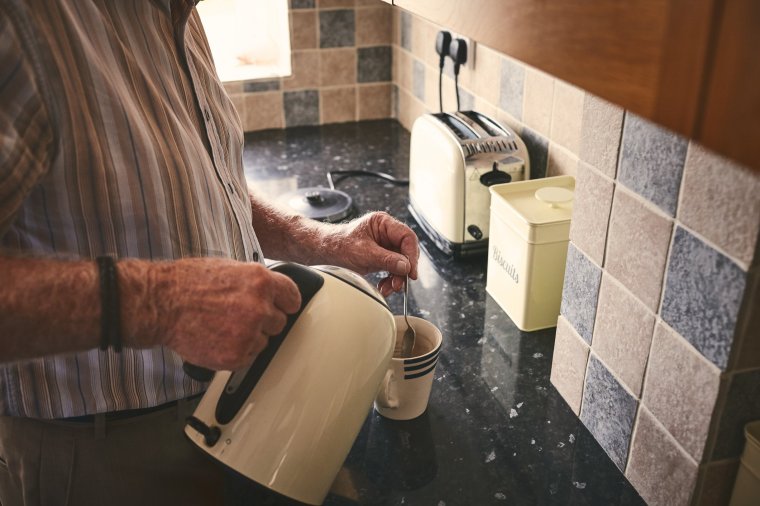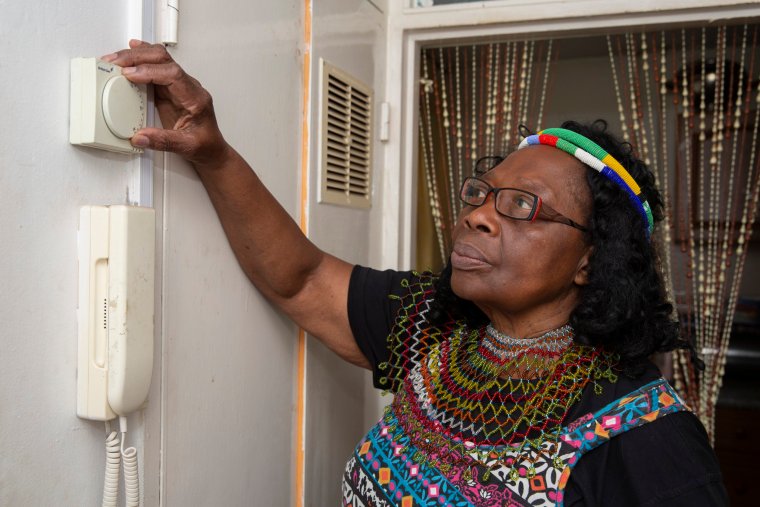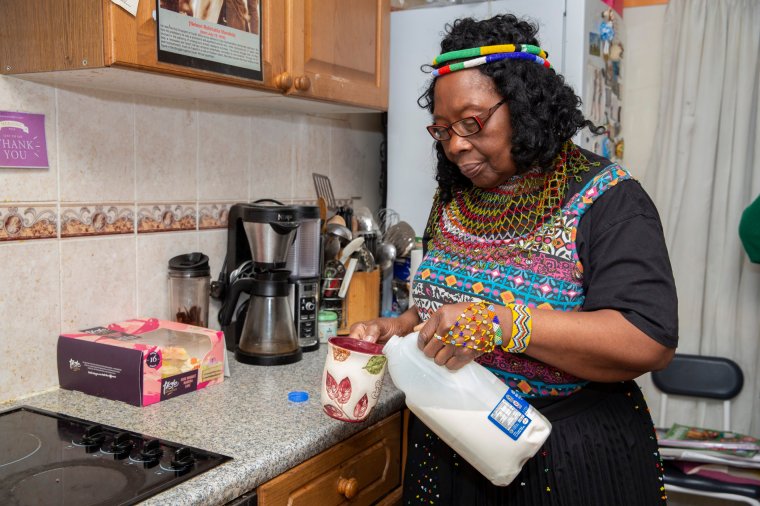Older people are resorting to desperate measures such as setting alarms to wake up in the middle of the night to boil water in an attempt to save energy costs , i has learned.
Some skip meals or spend hours sat in the dark every evening to avoid turning the lights on, as they battle to survive the crippling cost of living crisis.
YouGov polling for the charity Independent Age, which supports older people and their families, shared exclusively with i, reveals the extent of money worries older people are plagued with.
The research, involving 1,052 adults aged 65 and over, found that when thinking about their financial situation over the next six months, 50 per cent were worried about not being able to pay their gas or heating bill, while 49 per cent were anxious about their electricity bill.
But it isn’t just energy bills that are concerning older people, as the findings show other household bills are causing them anguish too: with 34 per cent saying they are worried about not being able to pay their food and drink bills, 24 per cent their water bill, 25 per cent their broadband and internet bill and 21 per cent their phone bill.
“There is an unhelpful narrative around everyone in later life being financially secure. That just isn’t the case and we know that over two million older people are living in poverty,” Morgan Vine, head of policy at Independent Age, told i.

“For many people in later life, the only option they have got to cope with the cost of living crisis is by cutting back because there isn’t anything else open to them. When you’re in something like your eighties, you’re not necessarily going to be able to go and get a new job or to increase your income in any other way.”
Ms Vine told i Independent Age hears harrowing calls to its helpline from older people who recount how they are being forced to make cutbacks on essentials because they just haven’t got enough money or are fretting about the future as bills continue to escalate.
“One person rang us and told us they were setting an alarm to get up in the early hours so they could go downstairs and boil a kettle to fill up a thermos flask so they wouldn’t have to boil water during peak times,” she says. “They were on a tariff where it was cheaper to use electricity during the night.
“We have people ringing in telling us they are switching all their lights off and sitting in the dark to save electricity and others tell us they are going to bed mid-afternoon to stay warm.
“There are also older people who tell us they are skipping meals or reducing the amount they are eating. The stories we are hearing are heartbreaking and the people we are speaking to are incredibly anxious because they don’t want to be in debt or miss a bill.”
More on Cost of Living Crisis
The Energy Helpline tells i that the cost of boiling a kettle during the daytime versus the nighttime depends on the individual’s tariff costs from their energy supplier and also the type of kettle they have and its energy consumption.
However, based on an average 3kw kettle and the current price for a unit of electricity being 34p per kWh, you can expect to pay 6.8p to boil a full kettle. If someone boiled a full kettle twice a day, it would cost them around £49.64 a year.
But with some nighttime tariffs being around a third cheaper, it could cost around 4.5p to boil a kettle in the middle of the night – and £33.09 to boil a kettle twice each day for a year during cheaper tariff hours.
Many older people have described how they are already cutting back on their spending to save money, with 56 per cent of those polled slashing spending on heating, 43 per cent on non-heating electricity, 37 per cent on fuel for their vehicles and 34 per cent on water usage by doing things like avoiding using their washing machine or having a bath.
Almost a quarter (22 per cent) have also cut back on their internet phone and television subscription services, 40 per cent have reduced their spending on social activities, 42 per cent their spending on clothing or footwear and 25 per cent the amount of money they spend on toiletries or personal care products.
Ms Vine told i the findings of their research showing how older people are already cutting back on many essentials are alarming.
“Many people later in life, particularly if they are living in financial hardship, may be in a position where their physical and mental health is not as resilient,” she said.

“They might be living with a long term health condition which could be made worse if they’re living in a cold home or are skipping meals or having to buy cheap food.
“People’s mental health is really on a cliff edge at the moment and they are extremely concerned about what is happening.
“It is not over-estimating the situation to say that this cost of living crisis can be life or death for some people in later life who are facing financial hardship.”
Thabani Sithole, 74, who lives near Brixton, London, with her 42-year-old daughter Khwezi, tells i the cost of living crisis is hitting older people hard, and even those who thought they had put money aside for later life are struggling as increasing bills are swallowing up their savings.
Thabani, who was born in Durban, South Africa, has been a single mum ever since her daughter was born as her daughter’s father died following a car crash when she was pregnant.
She was a critical care nurse for more than 50 years and her nursing career took her all over the world from Europe, Russia, Saudi Arabia to the UK, where she and her daughter have now been living for 23 years.
“I had a bad fall in 2012 and was diagnosed with osteoarthritis,” she tells i. “I retired from nursing in 2019 and pursued a new career in commercial casting and was with an agency and doing some jobs and the future was looking promising. My plan was to pay off the mortgage with the money I earned through that.
“However, then Covid hit and the jobs were cancelled and my osteoarthritis became worse. I was sick with shingles which almost killed me and I developed severe Covid which I didn’t think I would survive.
“I was trying to pay all my bills with my state pension and my little bit of savings went down the drain like water. When letters started coming from the bank and energy companies and other creditors saying how much I owed, I was so frightened and thought I was going to lose my flat.”

Thabani called Independent Age’s helpline and was told she was eligible for various benefits including pension credits, attendance allowance and council tax reduction. This has helped alleviate her financial situation, but she tells i she is still making cutbacks and doing things like wearing her coat in the house to keep warm and is trying to avoid putting the heating on.
“The pension credit and attendance allowance has allowed us to keep our roof above our heads,” she explains. “But the cost of everything is going up and I am worried about the energy prices.”
Thabani is recovering from a second knee replacement which she had done a few weeks ago and her daughter urges her to put the central heating on during the day because she knows it is not good for her to be cold with her condition. But Thabani says she tries to resist putting it on and keeps herself warm with multiple layers of clothing and only puts heating on for a short while at night when her daughter is back from work.
“We try to wear coats and jackets at home and I have an electric blanket which I turn on for one hour before I go to sleep and then wrap around my neck and switch off to keep costs down,” she says. “I still have about five years left on the mortgage and we still have a roof over our heads because of negotiations with the mortgage lender.
“The cost of living crisis is very difficult for older people, especially when I thought my life was organised and thought I would pay my mortgage off. But then my life turned upside down.
“I feel like I am always keeping an eye on the electric meter and gas meter to make sure we keep costs down as much as possible.”

Thabani tells i that she feels luckier than many older people as she has her daughter living with her. “I am lucky because Khwezi supports me so much and helps me pay the bills. But she is an administrator in a school, so her take home pay is not very much.
“We get our food from a food bank on Fridays and have to top up every week at the supermarket and try to get around £20 worth. But that has to include cat food and household needs like laundry detergent. Things are tight.
“But I know I am better off than a lot of people because I have my daughter helping me. There are so many older people who are still working, but can’t afford to pay their rent and bills and there are people living on the streets. Times are very difficult.”
Ms Vine from Independent Age says: “There’s definitely a misconception that everybody past retirement age is living a financially secure life, that they own their own home and don’t have a mortgage and have enough disposable income not to worry.
“Of course, this is the case for some people, but there are two million older people who are living below the poverty line. Even those who are technically above the poverty line, we are getting a lot of calls from saying they are incredibly worried as they don’t have enough spare money to pay the higher bills and costs they are now facing.
More on Older People
“Older people facing financial hardship have been struggling for a long time, before the cost of living became a huge problem as it is now. For those older people who were struggling before, it’s absolutely impossible for them to manage at the moment.
“The Government interventions, while welcome, are sticking plasters and short term measures. A lot of people in later life who we are speaking to are telling us they don’t know if more help will come, so they are already making cutbacks.”
A Government spokesperson has told i: “We recognise the pressures of the rising cost of living which is why we have delivered £1,200 of direct help to those most in need this financial year.
“On top of this, more than 11.6 million pensioners have received up to £600 per household to heat their homes and stay warm throughout the colder months – support which will be repeated next winter too.
“We have also committed to the biggest state pension increase in history thanks to the triple lock – a 10.1 per cent boost, which also applies to pension credit for low-income pensioners.”

